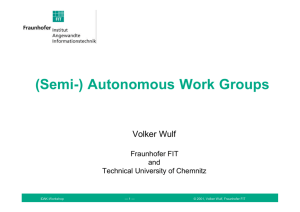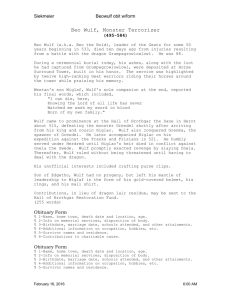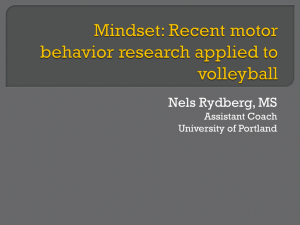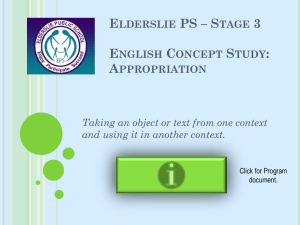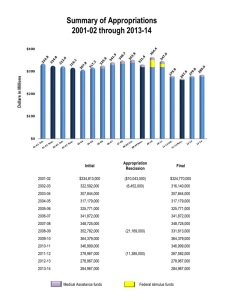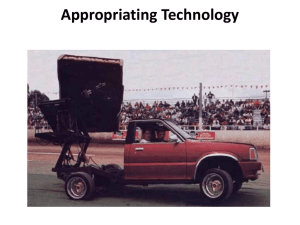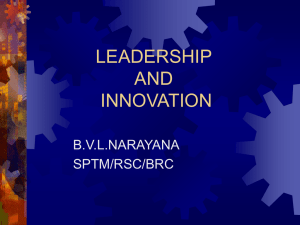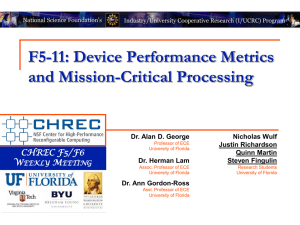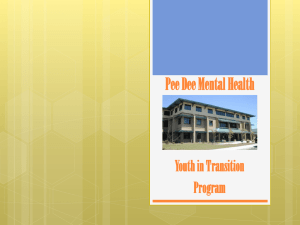Social Embedded Technologies
advertisement
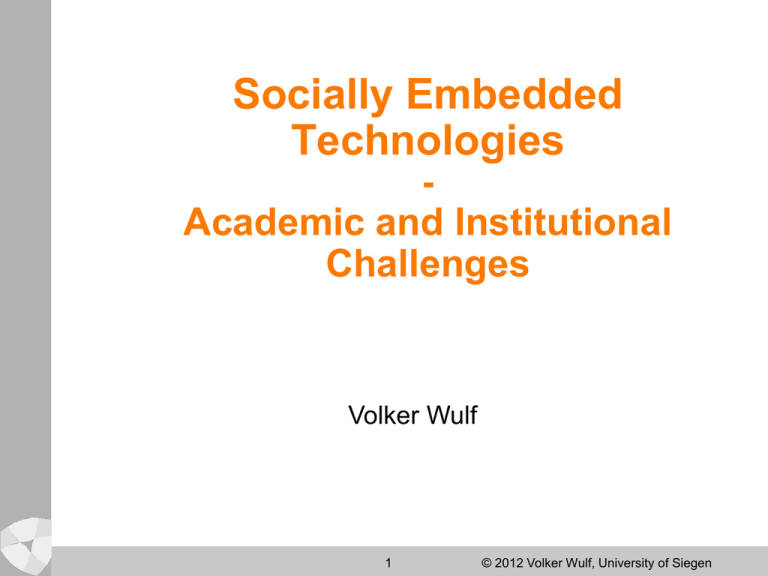
Socially Embedded Technologies - Academic and Institutional Challenges Volker Wulf 1 © 2012 Volker Wulf, University of Siegen Table of Content l l EUSSET: the vision Methods and Concepts: some examples » Design Case Studies » Infrastructuring l l l l Academic Challenges Knowledge building Institutional Challenges TODOs 2 © 2012 Volker Wulf, University of Siegen EUSSET: Understanding and Designing Social-Embedded Technologies l l l Computers are becoming an infrastructure for all/different domains of life Traditional CS / IS fields do not take the social embeddedness of technologies (sufficiently) into account European intellectual tradition is spear heading these issues » European CSCW / HCI / IS communities: quite some actors are in the room l Bringing together » Understanding of social practices in their differentiation » Designing of innovative technologies in a wide range of domains 3 © 2012 Volker Wulf, University of Siegen Academic Challenges Academic subfields suffer from epistemological divide (positivistic vs. constructivist research agendas) » » » » » Human Computer Interaction, Computer Supported Cooperative Work and Learning Ubiquitous Computing Software Engineering Information Systems EUSSET: a coherent research agenda » Understanding social systems (field of applications for innovative technologies) » Designing innovative technologies » Understanding their appropriation in the wild 4 © 2012 Volker Wulf, University of Siegen Design Case Studies: Long-term Engagement with Practice (Wulf et al 2009) Design Case Studies » Empirical analysis of given practices in a specific field of application, » (Participatory) Design of an innovative ICT artifact related to the findings of the empirical analysis » Investigation into the appropriation of the ICT artifact over a longer period of time. Prestudy Design Appropriation Definition describes an ideal type of studies, fragments are often interesting, interleaving temporal order of phases 5 © 2012 Volker Wulf, University of Siegen Design Case Studies in Specific Application Domains Cross-cutting Issue: Concept building Appropriation Support End User Develop ment Design Methodes Cooperative Work Community Support Sustainability Aging Society 6 © 2012 Volker Wulf, University of Siegen Infrastructuring: Toward an Integrated Perspective on the Design and Use of Information Technology (Pipek/Wulf 2009) 7 © 2012 Volker Wulf, University of Siegen Research Challenges Practices are hidden, partly digitalized, complex, developing Design: creatively linked to practices Technologies: design space is influenced by history of their emergence Appropriation: creatively inspired by innovative technological artefacts and transformativly linked to given practice Changes in practice: driven by multitude of factors Conceptual and theoretical problems- competition rather than cooperation 8 © 2012 Volker Wulf, University of Siegen Knowledge building in a situated research approach Current state of the art » Theories and concepts without evaluation and scope of validity » Accumulation of (design) case studies without knowledge building on top of them (Design) case studies within a constructionist paradigm » Linked to specific practices and IT design options » Case studies offer thick descriptions » Situated in specific context Theory and concept building is through comparison of multiple cases (corpus of studies) 9 © 2012 Volker Wulf, University of Siegen Domains of Research with Societal Relevance Internationally competitive production systems: technologies and work organization Ecological production and consumption of energy and raw materials Aging society: health care and social caring New forms of political participation and democratic legitimation New forms of multinational cooperation and economical regulation Migration: integration and reference to home community Issues of specific developmental needs: Agriculture, raw material production, education, health, global cooperation 10 © 2012 Volker Wulf, University of Siegen Europe: Institutional Strengths Europe has a strong intellectual tradition to ground the field » Philosophical foundations: Heidegger, Wittgenstein, Latour » Tradition of Socio-technical Systems » Movement of Participatory Design Evolutionary model of innovation Europe‘s funding is based on collaborative schemes between academia and practitioneers 11 © 2012 Volker Wulf, University of Siegen Europe: Institutional Problems EU-IST FP 7 (and 8?) does not provide much funding for EUSSET domains » Periperal work packages in a large variety of domains » Lacking funding in topic areas central to the community » National funding schemes work operate similarly Cooperation between academia and IT industries and IT user (organizations) does not work perfectly » European funding model ‚in theory‘ perfectly suited but needs some improvements » Better schemes and techniques required to bridge the gap between very different communities pf practice 12 © 2012 Volker Wulf, University of Siegen Europe: Institutional Problems - 2 European academic conferences suffer from international competition » Less submissions » Smaller participation » Missing plattform for publication, other than (expensive) commercial publishers or (US-dominated) ACM-DL European academic community » Segregated and distributed across different fields, little shared discourse » Stagnating in size and ageing core actors 13 © 2012 Volker Wulf, University of Siegen Open Issues: Academically Looking for an appropritate research and design paradigm for the EUSSET community » Bridging between technological innovation and ethnographical depth Building knowledge in a situated design community: issue of transferability beyond cases Bridging among disciplines Opening towards practitioners 14 © 2012 Volker Wulf, University of Siegen Organizational Issues EUSSET organization: financing, membership, leadership, mailing list(s) EU / National Government Lobbying: list of contacts, materials for contacting Exchange of (phd-) students, joint master program, summer school: Erasmus funding EUSSET Digital Library: presentation of conference proceedings New conference format, e.g. COOP: extended versions of publication format, discoursive presentation und documentation, integration of practitioneers Wikipedia presentation: Socially Embedded Technologies, Socio-Informatics, (E-)CSCW, Appropriation, …… 15 © 2012 Volker Wulf, University of Siegen
